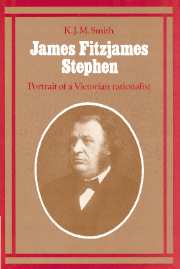Book contents
- Frontmatter
- Contents
- Preface
- 1 EARLY IMPRESSIONS: SIR JAMES, ETON AND CAMBRIDGE
- 2 A CONTROVERSIALIST IN THE MAKING: LITERARY CRITICISM AND LEADER-WRITING
- 3 A SCIENCE OF CRIMINAL LAW
- 4 ‘LAW LIVING AND ARMED’ – THE MECHANISM OF ENFORCEMENT
- 5 THE THREAT OF ‘HOOFS AND HOBNAILS’
- 6 INDIA AND THE IMPERIAL ETHIC
- 7 LIBERTY, EQUALITY, FRATERNITY: REFUTATION AND APOLOGIA
- 8 RATIONALISM'S BURDEN
- 9 THE BENCH AND BEYOND
- Notes
- Bibliography
- Index
- Frontmatter
- Contents
- Preface
- 1 EARLY IMPRESSIONS: SIR JAMES, ETON AND CAMBRIDGE
- 2 A CONTROVERSIALIST IN THE MAKING: LITERARY CRITICISM AND LEADER-WRITING
- 3 A SCIENCE OF CRIMINAL LAW
- 4 ‘LAW LIVING AND ARMED’ – THE MECHANISM OF ENFORCEMENT
- 5 THE THREAT OF ‘HOOFS AND HOBNAILS’
- 6 INDIA AND THE IMPERIAL ETHIC
- 7 LIBERTY, EQUALITY, FRATERNITY: REFUTATION AND APOLOGIA
- 8 RATIONALISM'S BURDEN
- 9 THE BENCH AND BEYOND
- Notes
- Bibliography
- Index
Summary
James Fitzjames Stephen was an outstanding, almost oversize, example of a variety of individual that Victorian England is sometimes credited with having made a symbol of the age: one who pursued an essentially conventional career alongside a broad vigorous intellectual absorption in the great social and political events England was then experiencing. The skeleton of Stephen's adult life was the law: mildly successful practice at the Bar between 1855 and 1869; service as Legal Member of the Viceroy's council in India from 1869 to 1872; and on returning to England, seven years of ultimately fruitless endeavour to codify the bulk of English criminal law, followed by twelve years on the High Court Bench from 1879 until retirement in 1891. They were years of legal practice complemented by the production of a collection of significant law texts, most importantly the General View of the Criminal Law (1863) and the History of the Criminal Law (1883), either of which would have been sufficient to establish Stephen as a criminal jurist of some distinction.
However, coexisting with Stephen the legal practitioner and theorist was Stephen the controversialist and polemicist, born of an avid, irrepressible sense of general inquiry coupled with an ‘hereditary strain of Puritan energy … glowing alike through faults and virtues’ (Middlemarch, ch. 1). It was a formidable energy turned in several directions largely through the medium of ‘higher journalism’.
- Type
- Chapter
- Information
- James Fitzjames StephenPortrait of a Victorian Rationalist, pp. ix - xiiPublisher: Cambridge University PressPrint publication year: 1988

